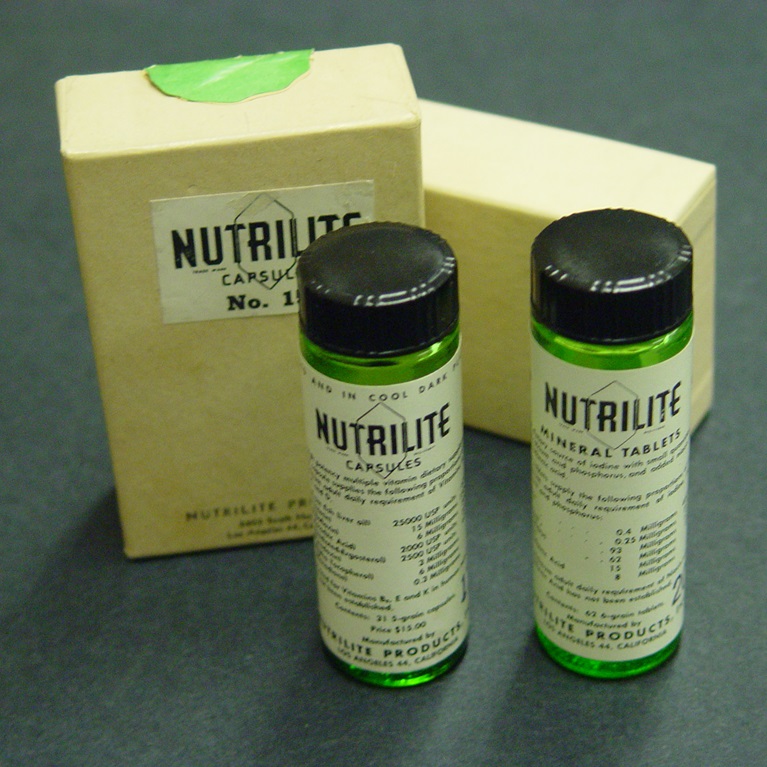


The origins of Nutrilite: A brand ahead of its time.

The origins of Nutrilite: A brand ahead of its time.
What is Nutrilite?
Nutrilite™ is Amway’s premiere brand of plant-forward vitamins and dietary supplements and one of its most popular product lines. In fact, Nutrilite is the world’s number one selling vitamin and dietary supplement brand.*
Nutrilite, Nutrilite Organics, Nutrilite Kids and n* by Nutrilite™ offer products that target an array of wellness needs, from everyday nutrition, healthy sleep and immune support to heart health, energy support and digestion.
Nutrilite vitamins have a starring role in Amway history as the brand precedes Amway by 25 years. Nutrilite Products Inc. was founded in 1934 by Carl Rehnborg, a man so committed to helping people improve their nutrition that he was using sustainable and organic farming methods generations before they became industry buzzwords. To help distribute his Nutrilite vitamins, Rehnborg was among the first to develop the sales approach commonly known as multi-level marketing.
It was this approach that ultimately created the Amway-Nutrilite connection. Before they founded Amway in 1959, Jay Van Andel and Rich DeVos were Nutrilite distributors for nearly a decade. By 1972, Amway had acquired Nutrilite.
Carl Rehnborg pioneers nutritional supplements
Before people knew what phytonutrients were and even before the word vitamin was widely used, Rehnborg was working in China, already observing the connection between health and a diet rich in fruits and vegetables. He was even experimenting with his own crude supplements.
Rehnborg took that knowledge back home to the U.S. and began working. His observation that a plant-based diet improved people's health led to his understanding of the importance of phytonutrients, or plant nutrients. He took a holistic approach to good nutrition and developed a line of products with ingredients sourced from his first farm – a tiny plot in California’s San Fernando Valley.
Nutrilite traceability and product quality
In order to ensure the quality of his products, Rehnborg made sure he had the ability to control the growing process for his crops from seed to harvest. That early quality control was a precursor of Amway’s commitment to transparency and traceability with Nutrilite products today.
The Nutrilite traceability review process ensures every plant grown on Nutrilite farms or partner farms is tracked from the day of its planting, how it’s cultivated in the fields, who harvested it and where it was sent for processing into Nutrilite supplements. This documentation is called the birth certificate of the plant.
Organic Nutrilite farms and sustainability
Amway’s commitment to sustainable farming practices also began with Rehnborg. Before organic and sustainable farming became a movement in the 1960s and rose among consumers to its current resurgence, Rehnborg wanted to make sure he could grow nutrient-rich plants while still keeping his farm’s soil healthy. He was committed to using no pesticides or chemical-based herbicides.
Today, Amway owns nearly 6,000 acres of certified organic Nutrilite farms in the U.S. state of Washington as well as Mexico and Brazil. Those farms continue to follow Rehnborg’s sustainable growing practices.
The Nutrilite farm teams treat the land as a living organism, using no pesticides, herbicides or synthetic chemicals to produce the fruits, vegetables, botanicals and herbs that are used to make ingredients for the Nutrilite products.
Instead of chemicals, GPS-controlled tractors and equipment with guidance systems are used to control weeds in between the rows of plants, cultivating the topsoil within an inch of the crop but not disturbing the plants. And they focus on natural methods of pest control.
Where these plants are grown is given as much thought as how they are tended. Each of the Nutrilite farms grows a different array of plants. That’s because where each crop is planted is tailored to the farm’s location, topography and microclimate to ensure the best results.
Taken together, all these details underscore why Nutrilite represents the best of nature and the best of science and why it remains one of Amway’s top selling brands.
*Source: GlobalData; https://gdretail.net/amway-claims
By selecting cancel, the new IBO must complete the rest of the registration process, including payment. You will not be able to return to the payment option.
The new IBO will receive an email with a link to complete the process